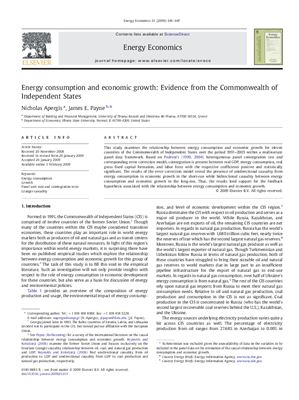Статья опубликована в журнале Energy Economics – 2009. – V.31, – P.
641-
647. На английском языке.
This study examines the relationship between energy consumption and economic growth for eleven countries of the Commonwealth of Independent States over the period 1991–2005 within a multivariate panel data framework. Based on Pedroni's (1999, 2004) heterogeneous panel cointegration test and corresponding error correction model, cointegration is present between real GDP, energy consumption, real gross fixed capital formation, and labor force with the respective coefficients positive and statistically significant. The results of the error correction model reveal the presence of unidirectional causality from energy consumption to economic growth in the short-run while bidirectional causality between energy consumption and economic growth in the long-run. Thus, the results lend support for the feedback hypothesis associated with the relationship between energy consumption and economic growth.
647. На английском языке.
This study examines the relationship between energy consumption and economic growth for eleven countries of the Commonwealth of Independent States over the period 1991–2005 within a multivariate panel data framework. Based on Pedroni's (1999, 2004) heterogeneous panel cointegration test and corresponding error correction model, cointegration is present between real GDP, energy consumption, real gross fixed capital formation, and labor force with the respective coefficients positive and statistically significant. The results of the error correction model reveal the presence of unidirectional causality from energy consumption to economic growth in the short-run while bidirectional causality between energy consumption and economic growth in the long-run. Thus, the results lend support for the feedback hypothesis associated with the relationship between energy consumption and economic growth.

